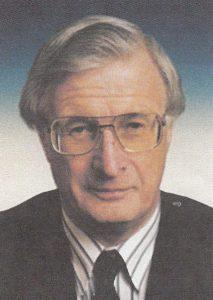
Brian Robinson was a consultant physician with a special interest in renal disease at East Birmingham Hospital (which later became Birmingham Heartlands Hospital). Within a few months of his appointment, he had established a renal unit for the study and treatment of end-stage renal failure, one of the first in a ‘non-teaching’ NHS hospital, and at one time one of the largest in Europe.
He was born in London, the son of Percy Harry Robinson, headmaster of Archbishop Tenison’s School, and Edith Margaret Mary Robinson née Else. He was educated at St Paul’s School, where he was a foundation scholar. He then won a major scholarship at St John’s College, Cambridge, and another to Guy’s Hospital, where he undertook his clinical training, being awarded prizes in clinical medicine, pathology and bacteriology.
His junior medical posts were also at Guy’s, and during this time he joined the Territorial Army. He then did two years National Service in the RAMC, and was thereafter in the TAVR (Territorial and Army Volunteer Reserve). In 1957 he returned to Guy’s, as a resident medical officer, and, in 1958, a junior registrar. He was subsequently appointed as a registrar and a medical tutor at Hammersmith Hospital and the Royal Postgraduate Medical School. His research interests lay in endocrinology and led to a Fulbright scholarship at Johns Hopkins Hospital in Baltimore. He returned to Guy’s as a registrar, becoming a senior registrar at University College Hospital in 1963, working under Max Rosenheim [Munk’s Roll, Vol.VI, p.394].
The idea of a department of renal medicine at East Birmingham Hospital had been sparked by the successful haemodialysis of a patient in acute renal failure by David Dukes and Derrick Felix-Davies [Munk’s Roll, Vol.VIII, p.151], and when Brian was appointed as a nephrologist in November 1965, he lost no time in starting a programme of maintenance dialysis, using the Kolff ‘tank’ with Baxter dialysers. The first two patients were a Welsh schoolmaster and an English woman; both patients did well for years. Patient numbers grew rapidly and so did dialysis technology, several innovations being developed ‘in-house’, and during his 29 years as director, Brian oversaw many changes in technique and equipment, and several moves to larger premises, culminating in a ‘purpose-built’ unit. Home dialysis was begun early on, and ‘satellite’ units set up in smaller hospitals and other premises.
Despite the administrative burden involved in continual expansion (and fundraising), Brian found time to serve on the committee on renal disease of the Royal College of Physicians, the executive committee of the Renal Association and the editorial board of Clinical Nephrology. He chaired the renal course committee of the Joint Board of Clinical Nursing Studies, was on the DHSS advisory panel on dialysis equipment, and the British Standards Institute working group on dialysis. He was one of the early members of the European Dialysis and Transplant Association, and became the editor of the Proceedings of its annual congress, and a member of its council from 1976 until 1984, when he became a senior member of the European Dialysis and Transplant Association-European Renal Association. He was the author and co-author of many publications on mineral metabolism, renal disorders, the treatment of end-stage renal failure, haemo- and peritoneal dialysis, and renal transplantation.
His involvement with the Territorial Army continued after his move to Birmingham; he served in the 202nd Field Hospital TAVR, was awarded the Territorial Decoration and reached the rank of lieutenant colonel. He retired from the Territorial Army in 1979.
Not surprisingly, all this left him sadly short of time for family and social activities, as it was on these occasions that he would ‘come out of his shell’ and reveal his friendly and humorous nature. His main sporting interest was cricket; no mean player himself, it was a source of great pride that his son achieved junior county status in the game. His abiding interest, however, was music. He was an excellent pianist, and this therapeutic activity enabled him to relax when he got home from hospital or committee room. He was a keen and appreciative concert and opera-goer, with a fund of tales about past and present musicians of note.
It was doubly distressing therefore that, only a few months after his retirement from medical practice in 2000 and a move back to the south of England, he suffered a small stroke, which seriously affected his skill as a pianist and his ability to enjoy playing. He was survived by his wife, Deirdre Pauline McCowatt née Montford, whom he married in 1955, and his children, Venetia and Nigel.
Courtesy Royal College of Physicians London, Munk’s Roll, Volume XII, page web